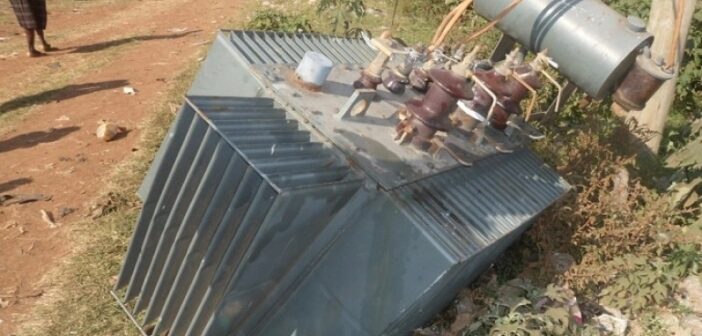Following the passing of Uganda’s new Electricity (Amendment) Bill 2022, Ugandans found guilty of vandalizing electricity infrastructure may face a fine of $283,764.96 (UGX 1-billion) or a 15-year jail sentence, just five years short of the Ugandan life sentence term of 20 years.
This passing of the bill came at a time when the country had been experiencing vandalism of power lines, transformers, poles and other related infrastructure at an increased rate. Of the 17 % distribution energy losses, 8 % is through electricity theft (people tapping the grid illegally, bypassing meters or not settling their bills, among others).
According to Parliament, the objective of the bill was to, among other things, provide deterrent penalties for theft of electricity and vandalism of electrical facilities, provide for the membership and funding of the Electricity Disputes Tribunal, provide for additional functions of the authority, as well as to increase funds allocated to the Electricity Regulatory Authority (ERA) from 0.3 per cent to 0.7 per cent of the revenue received from generated electrical energy.
Among the penalties contained in the Electricity Amendment Act, 2022 is the prescription to jail all persons found guilty of stealing electricity or destroying its infrastructure for 15 years or pay a Shs1 billion fine or face both.
“Legislators passed the bill in April, the penalty for interference with meters and electrical lines, vandalism and illegal connections was increased from the previously set amount of $28.36 (Shs100,000) or imprisonment for one year to Over $283,764.96 (Shs1 billion) or fifteen-year imprisonment or both for receiving vandalized electrical facilities, repeated vandalism and interference with electrical works,” said Mr. Julius Wandera, the Director for Corporate and Consumer Affairs Electricity Regulatory Authority.
It should be remembered that while passing the bill, members of Parliament agreed with the attorney general and proposed that the punishment should be prohibitive suggesting an increase in the fines as damaged infrastructure may cause much higher fees for repairs and faults as well as the social implications of failing electricity supply.
“The people taking down power lines and other infrastructures are not the common people down there. These vandals are very sophisticated people. So, we need to make the law very deterrent,” Uganda’s Attorney General, Kiryowa Kiwanuka defended the need for the hefty penalties.
“When you are setting up penalty factors like these, anyone trying to vandalize electricity or energy infrastructure should know they are likely ending up in prison. If you give them Shs50,000 and they vandalize 10 transformers, they are capable of paying you. So, for us we are telling you, you steal them, if you are not likely to get Shs1b, you get 15years. So, it is deterrent,” Mr. Kiryowa told Parliament at the time.
“When one tower is cut down through vandalism, the cost of one tower is about Shs350m. When one tower is cut down, it affects the people on both sides. So, for us to propose the penalty of Shs1b, we are just perfectly in order. So, the proposal is increasing from 10 years imprisonment to 15years,” Mr Emmanuel Otaala, the chairperson of the Natural Resources Committee, that processed the law, said shortly before it was passed on April 13.
Seconders of the tough penalty such as the Kiboga Woman MP, Ms Christine Kaaya, said the law will ‘cure’ the ills within the electricity sector, hence better the stability and supply of power across the country.
“We have provided for the cure not the prevention because when we talk about penalties, they have been there but getting the person who carried out the vandalism is still a challenge,” Ms Kaaya said.
Umeme’s Managing Director, Selestino Babungi, says with such penalties, it would go a long way in checking power theft and vandalism.
Babungi says with reduction in electricity theft, the end user tariff will reduce because there will be more units of energy over which to spread the sector’s generation, transmission, and distribution costs.
And, checking vandalism would mean resources are not diverted from expanding the grid to replacing destroyed transformers, poles and cables which tantamount to doing a job twice and sometimes thrice.
The genesis
In January, the Minister for Energy and Mineral Development, Ms. Ruth Nankabirwa, tabled the Bill that was meant to repeal the Electricity Act Cap 145 which was enacted in 1999. At the time of first reading.
Ms. Nankabirwa said: “The penalties under the current law are not deterrent enough to discourage theft of electrical energy and vandalism of electrical equipment. These criminal acts have consistently increased the cost of operation and maintenance of electricity infrastructure as well as the commercial losses experienced by the electricity distribution companies.”
The electricity sector has suffered a string of challenges along the chain of distribution with some areas pushed into darkness due to vandalism of infrastructure such as transformers for sinister motives.
It was registered that in a span of two years, 260 billion was lost due to theft of electricity assets.
Theft of electricity and infrastructure causes a big challenge in electricity distribution causing some areas to stay in darkness due to vandalism of infrastructure like transformers.



